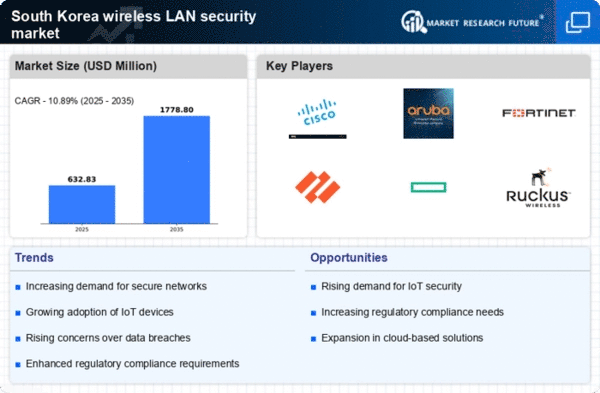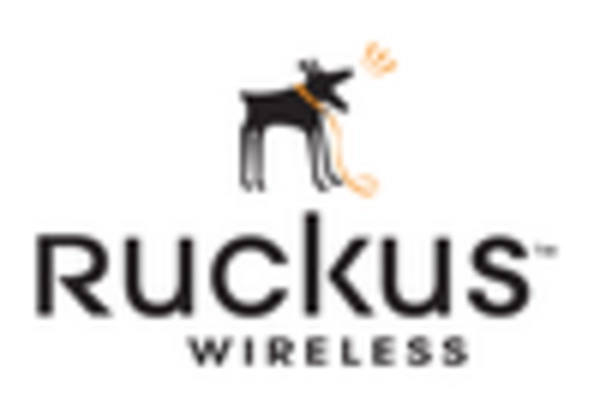Expansion of Remote Work Culture
The expansion of remote work culture in South Korea has a profound impact on the wireless lan-security market. As more employees work from home or remote locations, the reliance on secure wireless networks intensifies. This shift is projected to drive market growth by approximately 11% in 2025, as organizations seek to ensure secure access to corporate resources. The need for secure connections becomes critical, particularly when employees access sensitive data from various locations. Consequently, businesses are investing in virtual private networks (VPNs) and other security measures to protect their wireless communications. The market is likely to benefit from this trend as companies adapt to the evolving work environment and prioritize secure connectivity.
Rising Demand for Secure Connectivity
The market experiences a notable surge in demand for secure connectivity solutions. As businesses increasingly rely on wireless networks for operations, the need for robust security measures becomes paramount. In 2025, the market is projected to grow by approximately 15%, driven by the proliferation of mobile devices and the Internet of Things (IoT). Organizations are prioritizing the protection of sensitive data transmitted over wireless networks, leading to heightened investments in security technologies. This trend is particularly evident in sectors such as finance and healthcare, where data breaches can have severe consequences. Consequently, the market is likely to expand as companies seek to mitigate risks associated with unauthorized access and cyber threats.
Growing Awareness of Cybersecurity Risks
There is a growing awareness of cybersecurity risks among businesses in South Korea, which is positively impacting the wireless lan-security market. As high-profile data breaches and cyberattacks make headlines, organizations are becoming more vigilant about their security postures. This heightened awareness is expected to contribute to a market growth rate of around 14% in 2025, as companies seek to invest in comprehensive security solutions. The recognition that wireless networks are vulnerable to attacks has led to increased demand for security measures that protect sensitive information. Consequently, the wireless lan-security market is likely to thrive as businesses prioritize cybersecurity training and the implementation of advanced security protocols.
Increased Regulatory Compliance Requirements
The wireless lan-security market in South Korea is significantly influenced by the increasing regulatory compliance requirements imposed on organizations. With the rise of data protection laws, such as the Personal Information Protection Act (PIPA), companies are compelled to implement stringent security measures to safeguard customer data. This regulatory landscape is expected to drive market growth by approximately 10% in 2025, as businesses invest in compliance-driven security solutions. Failure to adhere to these regulations can result in hefty fines and reputational damage, prompting organizations to prioritize wireless security. As a result, the wireless lan-security market is likely to benefit from the heightened focus on compliance and the need for secure data transmission.
Technological Advancements in Security Solutions
Technological advancements play a crucial role in shaping the wireless lan-security market in South Korea. Innovations such as artificial intelligence (AI) and machine learning (ML) are being integrated into security solutions, enhancing their effectiveness against evolving cyber threats. In 2025, the market is expected to witness a growth rate of around 12% as organizations adopt these advanced technologies to bolster their security frameworks. The ability to analyze vast amounts of data in real-time allows for quicker threat detection and response, which is essential in today's fast-paced digital landscape. As businesses recognize the importance of staying ahead of cybercriminals, investments in cutting-edge security solutions are likely to increase, further propelling the wireless lan-security market.
















